How Do I Avoid a Plumbing Emergency?
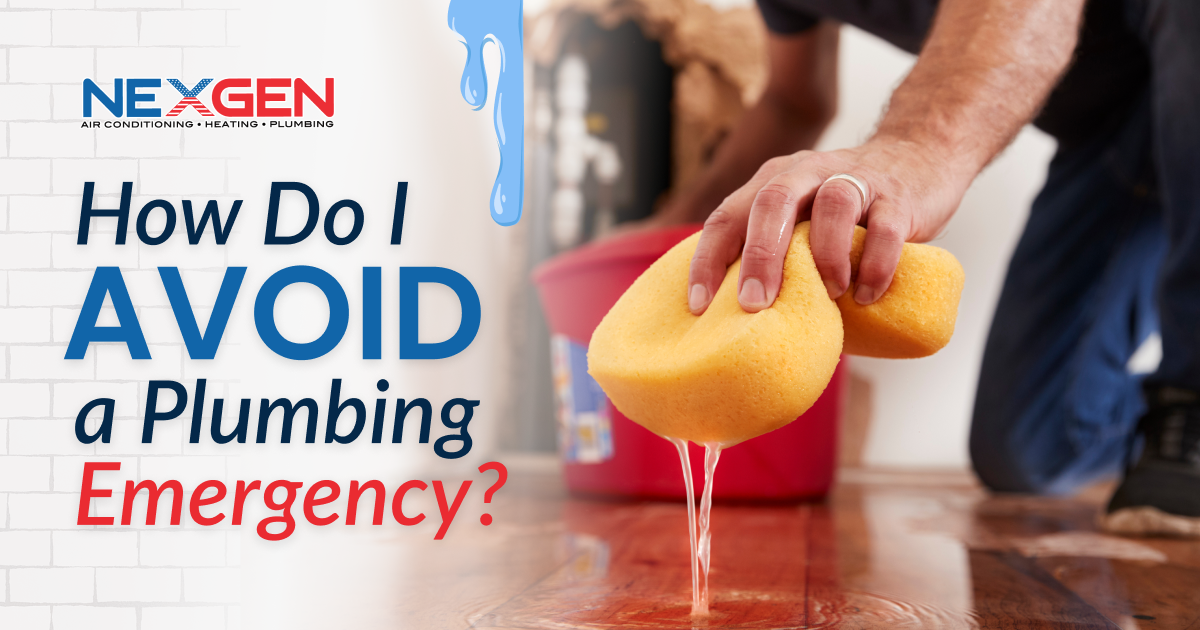
Plumbing emergencies are stressful, disruptive, and messy. Gallons of water can wreak havoc on your home before an emergency plumber arrives. However, pipe failures, overflows, and other mishaps can be avoided. Here are tips for preventing a plumbing emergency and keeping your home plumbing system in good shape.
Watch What You Put Down Drains
Whether using a sink, toilet, or garbage disposal, you can easily clog the drain line if you’re not careful. A clogged drain can cause an overflow and even damage pipes. To avoid an emergency due to a drain clog:
- Don’t Pour Grease, Fats, or Oils Down the Sink: These can become sticky and harden as they cool and attract other debris. Let these materials solidify before throwing them in the trash.
- Only Flush Toilet Paper Down the Toilet: Avoid flushing “flushable” wipes (they can get stuck in pipes) and don’t use drop-in toilet bowl cleaners. Items such as tissues, power towels, baby wipes, wrappers, and feminine products should also never be flushed.
- Be Mindful When Using Your Garbage Disposal: The disposal makes it easier to discard food scraps, but don’t add fibrous foods like celery or banana peels, cooking grease or fats, or hard items like bones or eggshells. Also, avoid putting coffee grounds, pasta, or rice in the garbage disposal.
Protect Your Drains
Use drain covers and strainers to prevent hair and other materials from clogging shower and bath drains. A combination of hair, soap, and personal care products can form a soggy mess in a drain line. Installing a simple product can prevent a plumbing emergency involving a clogged drain.
Check for Leaks Regularly
It can be easy to pass on a tiny drip or leak as not a big deal. However, if there’s any dripping or moisture around sink faucets or a valve, pipe connection, hose, or fitting, call an emergency plumber. Refrigerators, washing machines, and dishwashers are also prone to leakage. Consider replacing rubber appliance hoses with stainless steel reinforced ones as they are less likely to leak or break.
At the very least, a small leak can waste hundreds of dollars. But failing to fix one in time can lead to a costly outcome. Make a habit of checking for small leaks to avoid such a situation. Common signs, aside from water stains, include musty odors, a high water bill, a flooded/muddy lawn, and foundation cracks.
Monitor the Water Pressure in Your Home
You don’t need an exact measurement of water pressure (although gauges are available). The pressure in each home varies slightly. However, take note of any sudden drops in water pressure when washing the dishes or taking a shower. If you suspect it's from a faucet or shower head, clean the aerators. But if you don’t know why the pressure is dropping, call a plumber to check for a hidden plumbing or water main issue.
Know Where Your Water Shut Off Valve Is
Sometimes plumbing emergencies and accidents happen. Know where the main shut-off valve and fixture shut-offs are located and how to use them before anything goes wrong. When it does, you can turn the water supply off, preventing damage to floors, walls, and ceilings. Rather than replacing building materials, you may just need to dry out some wet towels or rags.
Avoid Drain Cleaning Chemicals
Store-bought drain cleaners contain chemicals that can dissolve clogs and the material that makes up your pipes. If you use them too much, you might ultimately deal with a burst pipe. To avoid this, you can use a drain snake to physically dislodge whatever is clogging the drain. However, repeated clogs should be dealt with professionally.
Flush Your Water Heater Tank Once or Twice a Year
Sediment from minerals in water can build up in a water heater tank. When this happens, the appliance will produce less hot water. It will also run more frequently, leading to increased energy usage and potentially overheating and cracking the tank’s lining. You can flush the tank if you’re equipped to, but a plumber can more thoroughly clean the tank during annual maintenance.
Schedule Regular Plumbing Maintenance
A routine inspection can avoid having to call an emergency plumber. An inspector can address slow drainage, clogged drains, low water pressure, toilets that don’t flush properly, and issues with water heaters. Skilled plumbers have various tools to test and inspect plumbing systems. They also use advanced, non-invasive methods to address minor issues and even perform some major repairs or replacements.
Call NexGen 24/7 for an Emergency Plumber
If you have a plumbing emergency, our fully licensed and insured technicians can reach your home quickly and provide an efficient solution. They’re equipped to find the cause and fix it fast. No matter the size or scope of the problem, they’ll fix it right, from a drain clog to a malfunctioning garbage disposal to a burst pipe or a gas leak. Contact us even if there’s just a small water leak. For emergency plumbing service and competitive pricing in Southern California, call NexGen at (805) 301-6788 today.
Is it Worth It To Repipe a House?
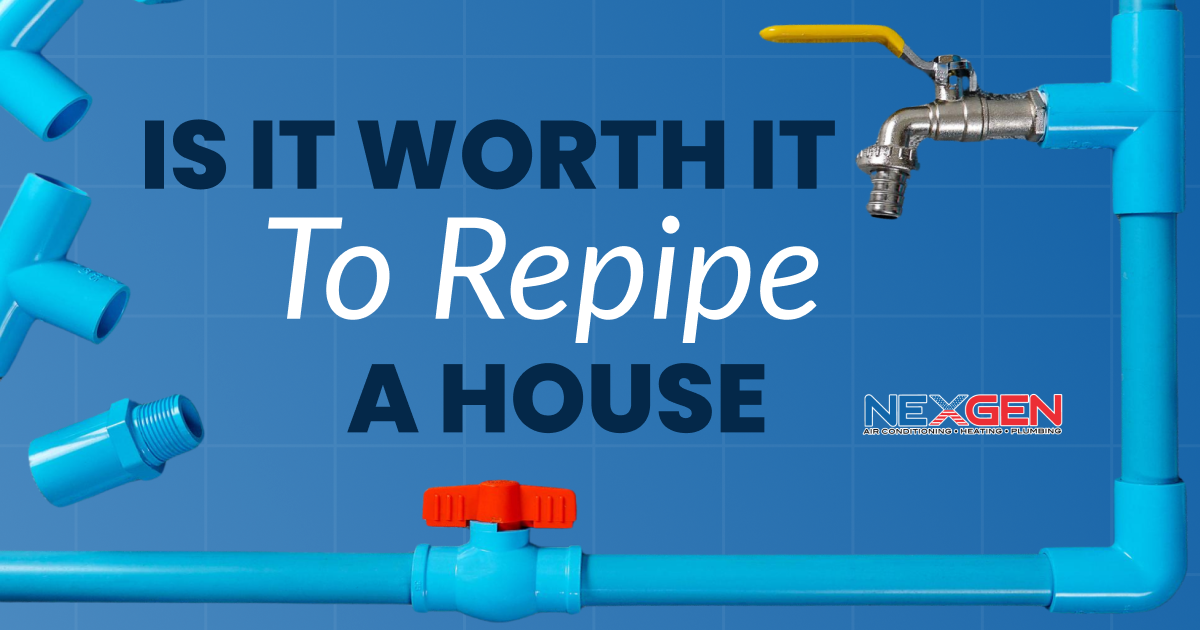
Homeowners and plumbers in Southern California often find repiping a house worth it for many reasons. The national average to repipe a house is $7,500 (although it can cost much more).¹ It is a substantial project but can have many long-term benefits. We’ll now look at why pipe replacement is a wise investment.
Repiping a house can:
Increase It’s Value
A potential buyer may see old piping as a reason not to purchase a home. No one wants to invest in a home and then have to pay to replace the plumbing system (or deal with a burst pipe, flood, or water damage). New pipes can last 100 years or more and increase your house's market value since buyers may find new pipes more appealing. Repiping can end up having a solid return on investment.
Improve Water Pressure
Old pipes can clog with sediment and limescale, causing drops in water pressure. Whether you’re cooking, cleaning, taking a shower, washing your car, or otherwise using water, low pressure can increase the amount of water you need. Daily tasks will also take more time. Replacing old pipes with new ones should increase water pressure so you can manage these tasks more quickly and efficiently.
Better Water Quality
As old pipes rust and corrode, your water supply can get contaminated. Therefore, water may taste funny, smell bad, and be unhealthy to drink. Water temperature can also fluctuate due to issues with older pipes, which can cause the regulating valve to malfunction. Water discoloration is a sign of rust or sediment buildup (especially if it’s yellow or brown). There’s no quick fix for any of these issues. If the pipes are several decades old, they must be replaced by an experienced and licensed plumber.
Fewer Plumbing Issues
Dealing with frequent plumbing repairs is inconvenient and expensive. Many problems may appear as water lines age. Weakening pipes can trigger multiple leaks. Patching each one up takes time and can lead to bigger problems later. If you often find leaks or signs of moisture on old pipes, they may be deteriorating, so a repiping project is worth it, considering the risk of a plumbing failure.
Eliminate Mold
Mold growth is another risk with old pipes. If mold is growing inside them, musty odors may spread throughout your home and a release of toxins can pose serious health risks to your family. Aside from odors, signs of mold in pipes include visible growth on surfaces near water lines and plumbing fixtures.
A combination of moisture, warmth, and the presence of organic matter creates a breeding ground for mold. Oftentimes, you can clean the affected area and improve ventilation. If the problem is severe enough, repiping may be necessary.
Why Hire Professional Plumbers Near Me for Repiping?
A DIY repiping project can potentially save on costs. However, this potential doesn’t match the benefits of hiring a professional. You would have to invest in specialized tools that require training and experience to use correctly. These can also be quite costly on their own. Plumbers can justify the costs with the profits they make on their services.
Also, repiping an old home can be dangerous. You can encounter safety hazards such as sources of electricity and gas lines. A shock or a gas leak can cause serious injury or death. If a pipe or fitting is improperly installed, water leaks, water damage, and other problems could occur and require expensive repairs.
However, a professional has the expertise and experience to successfully repipe your home and assure high-quality results. Their work may be warrantied and your old plumbing equipment will be properly disposed of. Although the upfront installation cost may be high, a plumber can save you money in the long run.
Schedule Piping and Repiping Services
NexGen is a leading plumbing services company in Southern California. Fully licensed and insured, our plumbers near you can make repiping a house worth it through their expertise, precision, and dedication. They can address any issue and have the tools and equipment to get a repiping project done on time and within your budget. For an affordable solution, fast service, and pipe installation methods that minimize disruption, call (805) 301-6788 today.
Source:
Tankless Water Heater Repair vs. Replacement
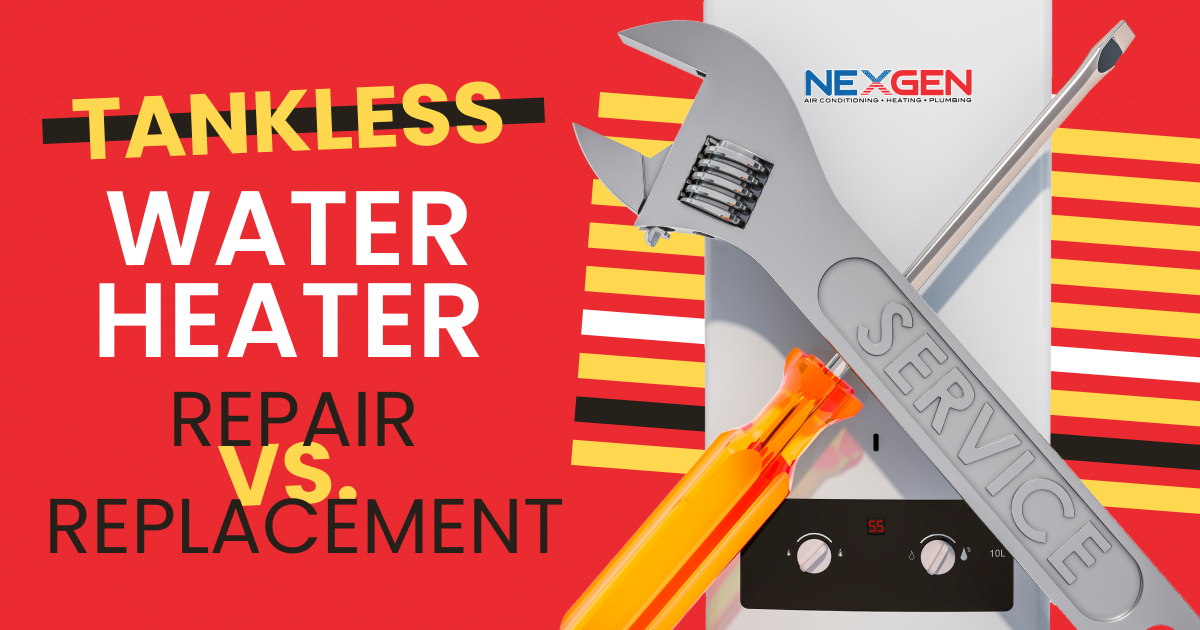
In many cases, tankless water heater repair can resolve an equipment problem. However, replacing the unit may be the better solution, depending on the issue and age of the system. NexGen is a leading provider of tankless water heater services in Southern California. Using our knowledge and expertise, we’ll help you weigh the decision to repair or replace a tankless system by considering the following questions.
How Old Is Your Water Heater?
Tankless water heaters can last 20 years or more. But should you use one until its very last breath? This often requires spending money on repairs that can go towards purchasing a new unit.
While some repairs aren’t that expensive, there are a few considerations. For example, if comparable models are more efficient or the warranty has expired, investing in a new model can save you in the long run. Replacement is often discussed when an older model requires a major repair.
What Will Repairing the Unit Cost?
The cost of repairs is a big factor, especially if the water heater was recently fixed and is likely to need additional service soon. Generally, if a repair is more than 50% of the cost of installing a new tankless water heater, consider replacing it. If a repair estimate is less than that, repairing the unit can be cost-effective if it doesn’t break down frequently or requires multiple repairs.
When Was the Last Repair?
When one part goes bad, other parts may be affected. Therefore, the unit may work less effectively even after being fixed. You may need to schedule tankless water heater repair every few months, which is costlier than taking advantage of the latest technology that can improve efficiency even more than your existing heater did when new.
Is the System Serving Its Purpose?
If the answer is no, you’ll benefit by replacing your tankless water heater rather than repairing it. Signs you need a new one include water not being warm enough, hot water running out quickly, or the unit not keeping up with demand (especially when two or more fixtures are used simultaneously).
Is the Unit Working Properly?
If there are signs something is wrong with your tankless water heater, consult a professional to weigh a repair vs. replacement decision. A noisy unit can mean there’s excessive sediment buildup or a potential mechanical failure. The most concerning noises include banging, popping, crackling, and hissing. Repairing the system may be possible if it’s serviced in time and maintained properly, but there’s always a concern that one faulty component can cause others to fail.
How Is the Water Quality?
Unless an issue with your local water supply is causing water to have a poor taste, foul odor, or cloudy or rusty appearance, the problem is likely with your water heater. Tankless water heater repair may be an option. But if the unit is severely worn or corroded, replacement is the better solution.
How Efficient Is Your Water Heater?
Any water heater that’s wasting energy should be replaced, especially since repairs can be expensive. Look for issues impacting efficiency, such as a leaky tank (which accelerates heat loss), damaged insulation (preventing the tank from retaining heat), or a malfunctioning burner assembly (your water heater will use more energy but be unable to supply enough hot water).
Are Your Water Heating Bills Increasing?
The cost of your energy bills is another way to assess how efficient your tankless water heater is. Your monthly heating costs should be lower after installing one. However, if your energy bill is increasing with no reasonable explanation, consider replacing the unit (especially if it’s been used for several years and hasn’t had annual maintenance). After all, tankless units are designed to conserve energy and save on utility costs.
Contact NexGen for Tankless Water Heater Repair or Replacement
A tankless water heater can save on monthly energy bills, conserve space, and provide cleaner water than a tank-based model. It can also last longer and qualify you for tax credits. At NexGen, we install natural gas and electric models. Therefore, when it comes to tankless water heater repair and installation, you’ll have a unit that best suits your home. Continue browsing to learn more about our services, maintenance programs, and opportunities to save, or call (833) 729-9735 to request repairs or a consultation.
Types of Professional Drain Cleaning Services
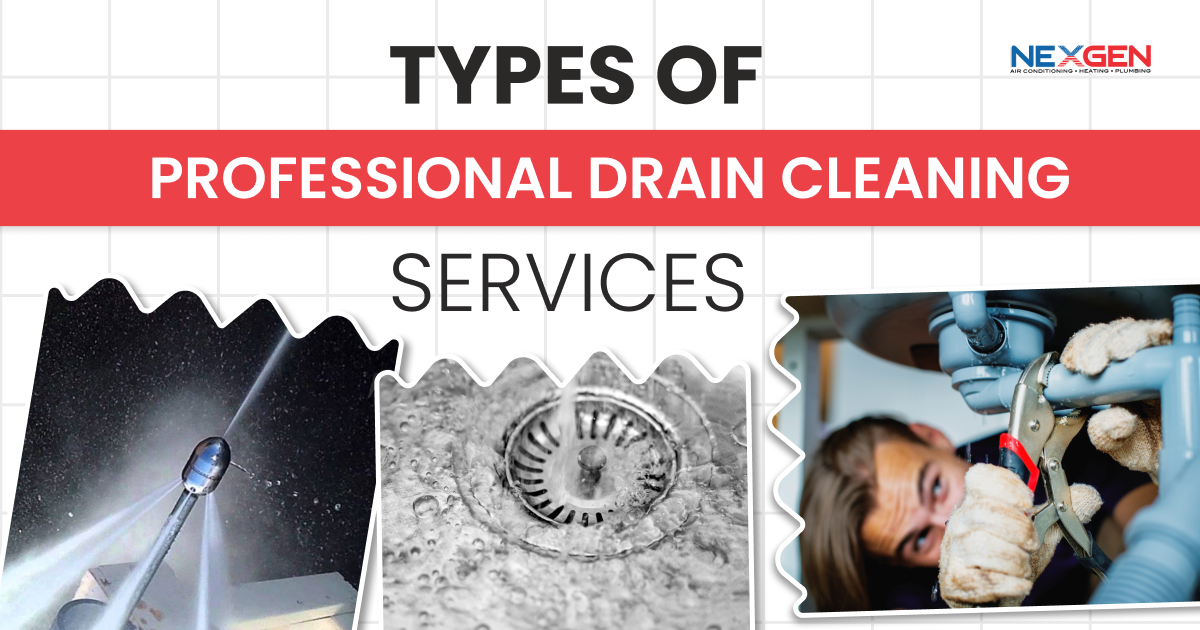
There are different types of professional drain cleaning services to consider. This is important to know when requesting emergency service or routine maintenance and enables a plumber to address a wide range of problems. A clogged drain can occur for various reasons and cause odors, odd noises, and water backups.
When you call a local contractor, a qualified professional can provide drain cleaning services such as:
Video Pipe Inspection
A video camera inspection is often the first step to unclogging a drain. It involves inserting a digital camera and LED light mounted to a fiber-optic cable into the line. The images are transmitted to a monitor so the problem can be viewed onscreen and a technician can determine the nature, size, and location of a clog. By analyzing what they see, the plumber can determine the best method and tools for removing the clog and preventing future issues.
Based on what they see, a technician can move forward with removing an abundance of material that’s clogging the line. Grease or tree roots require different methods to address. If frequent clogs are being caused by a shifting foundation, the associated pipe damage will have to be repaired and other service professionals may be needed to address the problem.
Chemical Drain Cleaning
There are many chemical drain cleaning products on the consumer market. However, many of them can corrode pipes and cause chemical burns on your skin. A licensed plumber has access to more effective products and the skills and equipment to handle such chemicals safely. Professional-grade products are also more effective at reacting with and dislodging organic blockages in drain lines.
Air Burst Drain Cleaning
A drain cleaning service professional can use equipment to accelerate a gas, such as carbon dioxide, to break up and dislodge a clog. Pressurized gas provides enough force to reach blockages farther down the drain. Despite the force of the gas, it does not damage the interior of pipes.
Drain Snaking
A drain auger provides a more traditional method of clearing a drain line. It’s not new but remains a preferred method of attempting to remove a severe clog. The auger head has blades or a screw-like head and is turned via a crank or motor. As it rotates, it cuts through whatever is obstructing the pipe. Some augers can grab onto and pull the material out. While a consumer drain snake may not reach very far, plumbers can use motorized equipment that can reach up to 100 feet or more.
A drain cleaning service that uses drain snaking is often referred to as a roto-rooter service. Both drain snaking and a roto-rooter service are the same thing.
Hydro jetting
A more recently developed drain cleaning service, hydro jetting uses high-pressure streams of water to dislodge clogs and force them through your plumbing system. The material blocking the pipe is pushed into the waste lines and sewage system, while the internal walls of pipes can be scoured clean to reduce the risk of future clogs. A plumber may set the hydrojetting machine to a pressure of up to 35,000 PSI. It can clear food, grease, hair, mineral deposits, and other blockages no matter how long the drainpipe is.
Drain Sewer Cleaning
A blockage can sometimes form inside a sewer line. It requires specialized snake equipment and other tools to clean, but a plumber can often perform sewer cleaning from inside your home or via the clean-out located outside (one can be installed if you don’t have it).
Sewer cleaning is needed when tree roots invade sewer lines. Professional plumbers have equipment that allows them to access and break up tree roots that have infiltrated a pipe. They can also use non-invasive methods to replace affected sections of pipe.
When Should I Call a Professional Drain Cleaning Service?
It’s a good idea to call a plumber to determine which of these services you need if:
- A sink is taking longer to drain
- Water is bubbling up from a drain
- A toilet flushes partially or not at all
- Water backs up in the shower when you flush the toilet
- Foul odors come from a drain or plumbing fixture
Schedule Professional Drain Cleaning Services in Southern California
NexGen has a team of fully licensed and insured technicians who can quickly diagnose and fix any plumbing problem. They’re equipped with the latest tools, including state-of-the-art camera inspection and hydrojetting systems, to get the job done right and prevent issues from recurring. Check back often for featured discounts. To schedule drain cleaning services and receive a free quote, call (833) 729-9735 today.
Can Water Heater Repair Improve Efficiency?
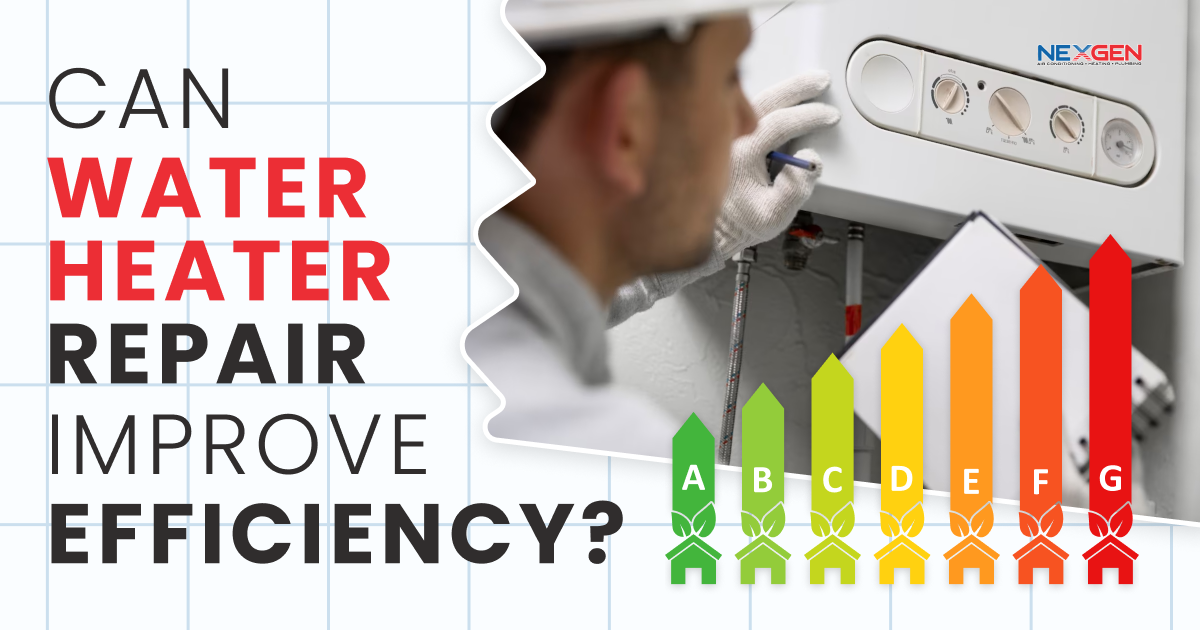
Improved efficiency is one of the greatest benefits of water heater repair. A technician can correct issues that cause the unit to be overworked and consume more energy. We’ll explain in more detail how repairing your water heater enables it to run more efficiently.
If your water heater needs to be repaired, its efficiency can be reduced due to these factors:
- The System Uses More Electricity: If a burner or heating element is malfunctioning or there’s a problem with an electrical connection, the unit may draw more power. Therefore, it becomes less energy efficient.
- An Increase in Water Usage: A struggling water heater will take longer to produce hot water. Therefore, you’ll leave a water faucet or fixture running longer, so water is wasted as you wait for it to become hot. Water heater repair can improve efficiency simply by reducing water consumption.
- A Heating Element Fails: An electric water heater usually has two heating elements. The second element will work twice as hard if the first breaks, causing the water heater to work less efficiently.
- Sediment in the Tank: A water heater in disrepair may have sediment in the tank. It typically originates from minerals in the water that crystalize and settle to the bottom. A buildup of sediment slows down the system and forces it to use more energy.
Water Heater Repairs Help Improve Energy Efficiency
A problem with a gas control, burner, or temperature-pressure relief valve can interfere with the unit’s water-heating ability. To restore performance, the technician can check for, find, and fix these issues. Replacing a small component is often enough. But a lack of hot water can also be due to a faulty thermostat. Call for help if adjusting the thermostat doesn’t increase or decrease water temperature.
However, if the tank is leaking, the water heater will have to be replaced. A leaky tank can significantly reduce efficiency. The system will also struggle to maintain the proper water temperature. Leaking water can increase your water bill and cause water damage as well.
Other Ways to Improve Water Heater Efficiency
Water heater repair comes in many forms, and maintenance is also important. You don’t have to wait for the water heater to break down for a technician to help it run more efficiently. Here are a few ways they can reduce energy consumption:
- Flush the Water Heater: You can follow the manufacturer’s instructions for draining sediment from the tank. Or, you can hire a technician who can quickly flush the tank to ensure the system runs at peak efficiency.
- Insulate the Tank and Pipes: Heat energy can escape through the tank and the piping connected to your water heater. By insulating the water storage tank and exposed piping, heat loss can be minimized. An insulation blanket is an easy and inexpensive way to protect the tank.
- Install a Volt Timer: A tank water heater works 24/7 to keep water hot. If you have an electric unit, a contractor can install a volt timer that turns it off at night when you are asleep. That’s one-third of the day the unit isn’t consuming energy.
Call NexGen for Water Heater Repair
Whether you need help with water heater repair or installation, you can trust NexGen for high-quality service. Our licensed, experienced technicians ensure water heaters in homes and businesses across Southern California work flawlessly. They can diagnose and fix any problem to improve your system’s performance and efficiency. To request help, book service online or call (833) 729-9735.
What Does a Home Water Filtration System Cost?
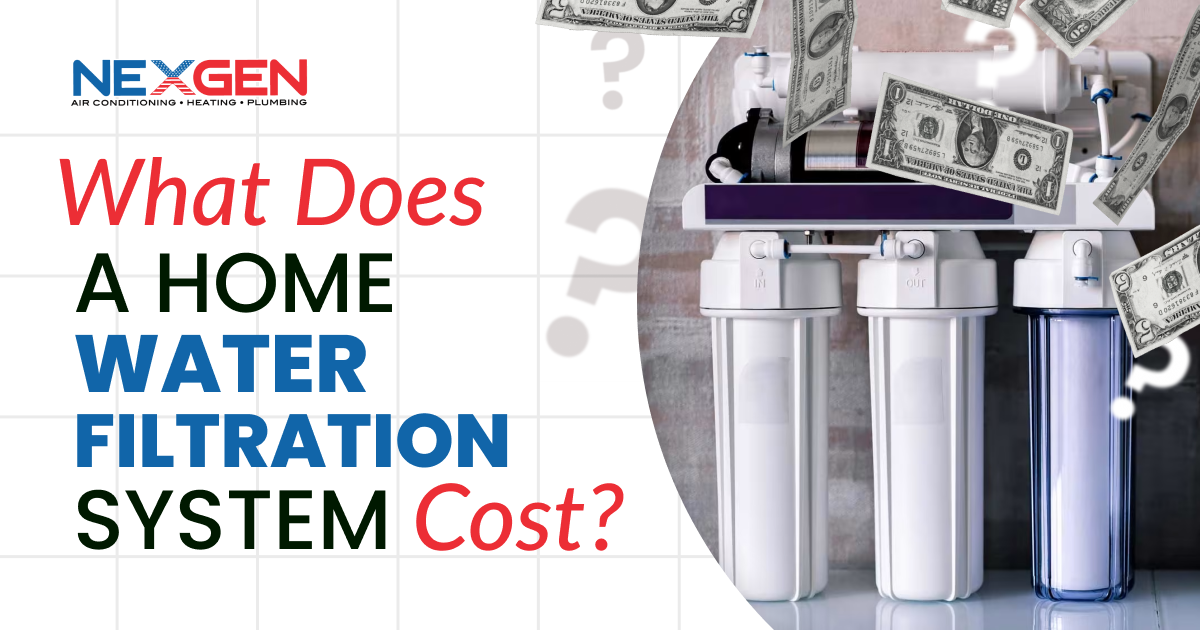
The cost of a home water filtration system varies considerably. According to HomeAdvisor, the national average is $2,050, with a range of $1,044 to $3,266.¹ However, HomeGuide estimates a whole home system can cost as much as $5,400 on average.² We’ll explain the factors that impact the total cost and some reasons why you should consider having NexGen install a home water filtration system for you.
How Is the Cost of a Water Filtration System Determined?
There are many types and sizes of water filtration systems. The type of system is only one cost factor but is perhaps the most significant one, so that’s where we’ll start.
Type of System
A water filtration system can serve a single fixture or purify the water supply for your entire home. The types of systems available include:
- Whole-House Water Filtration Systems: You may pay as little as $850 for a carbon, mineral, or sediment filter, but one with an ultraviolet (UV) light element can cost as much as $2,900. A system that also integrates a water softener can cost up to $5,400. Reverse osmosis filtration systems are the most expensive; they can cost from $4,800 up to $8,000. However, these can remove 99% of the contaminants in the water supply.²
- Under-Sink Water Filtration Systems: When you factor in equipment costs and labor, an under-sink unit ranges from $170 to $580 on average.² It may include up to three filters that allow for pre-filtering and water conditioning. Types of under-sink filters include reverse osmosis, carbon, alkaline, sediment, and heavy metal filters. They also include water softeners.
- Well-Water Filtration Systems: You may spend between $800 and $4,000 to install a well-water filtration system for your entire home.² Well water typically requires more filtration and local water quality has a significant impact on the price. Some of the technologies that may be used include UV light, distillation, reverse osmosis, chemical injection, particle, or activated carbon filtration.
- Rainwater Filtration System: Rainwater filtration systems can include distillation, reverse osmosis, or UV-light treatment. You’ll pay for pre-storage gutter and downspout collection/filtration and post-storage filtration. You’ll also have to purchase a storage reservoir. And the total cost also depends on whether this water will be used for drinking or gardening.
Treatment Method
As mentioned, a reverse osmosis system is the costliest but removes most metals, chemicals, and pathogens. Even for an under-sink unit, you may pay up to $950. Whole-house or under-sink UV water filtration units (which kill bacteria and viruses) can cost up to $1,500. Whole-house water softeners cost up to $2,500, and whole-house chemical injectors cost up to $1,500. A full water distillation system can be up to $3,600.²
Labor
The labor to install a whole-house system can cost from $200 to $600. In contrast, an under-sink filtration system ranges from $120 to $300.² A plumber, manufacturer-certified specialist, water-treatment installation company, or home improvement store contractor can install a home water filtration system. The cost of labor varies based on the installer’s rate and your geographical location.
Other Cost Factors
Aside from the type of system, treatment method, and labor, other factors that influence the cost of a home water filtration system include:
- Testing: Water testing by a professional helps determine the best type of system for your home. It costs from $100 to $300.²
- Equipment Brand: Higher-end, more efficient models with more features and greater contaminant-removal capabilities are more expensive.
- Plumbing Updates: If you need a 25+ foot pipe connection installed, it’ll cost $150 to $850. Plus, a plumber charges anywhere from $45 to $150 per hour.²
- Electrical Outlet: An electrical outlet must be placed within 10 to 15 feet of a whole-house filtration system’s tank. Installing one costs $150 to $350.²
- Permit: Depending on your location, a plumbing permit can cost $30 to $500, but one is necessary for installing a large water filtration system.²
- Replacement: You’ll be charged $40 to $300 to remove and dispose of an old water filtration system.²
- Drywall Repair: The cost to repair holes in sheetrock made to install water filtration lines ranges from $100 to $400.
Is a Home Water Filtration System Worth It?
Water filtration systems have many benefits. By investing in one, you’ll have safer drinking water, especially if you have an older home with lead pipes or use well water. A filtration system can remove chlorine and minerals, so tap water tastes better. It can also address hard water so there are fewer stains on dishes, clothes, and fixtures. Pipes and appliances are protected against mineral buildup and impurities, so they can last longer.
Contact NexGen Today
NexGen specializes in the installation and repair of home water filtration systems. Our fully licensed and insured technicians provide high-quality service to ensure your water supply is clean and safe. We service all makes and models of water filtration and cooling systems, while our team is experienced with HALO water filtration, purification, and conditioning equipment. Members of our X Protection Plan receive extended parts and labor warranty along with priority service. To learn more about our water filtration services or schedule free water testing, call (805) 301-6788 today.
Sources:
A Guide to Plumbing System Types, Components, and Fixtures
 In this guide to plumbing systems, we’ll cover the various elements that supply, drain, and manage water in your house or building. A functioning system provides all the water you need and use. Most people don’t think about its complexity. It incorporates many parts and, which may seem surprising, multiple systems. We’ll now explain what your plumbing system is made of:
In this guide to plumbing systems, we’ll cover the various elements that supply, drain, and manage water in your house or building. A functioning system provides all the water you need and use. Most people don’t think about its complexity. It incorporates many parts and, which may seem surprising, multiple systems. We’ll now explain what your plumbing system is made of:
Types of Plumbing
There isn’t one but three systems that make up the plumbing in your home. Each fulfills a distinct function and, together, they allow for the delivery and removal of water and waste. These systems are:
Potable Plumbing
A potable plumbing system brings water into a structure for drinking, cleaning, and other purposes. It includes the main plumbing valve where you can turn off the water supply and the water meter that tracks water usage. Other components include long or short straight pipes, T-sections that direct water at right angles, elbows that provide directional adjustments, and brass and gate valves that help regulate water flow.
Sanitary Plumbing
A drainage system removes human waste and wastewater. To ensure continuous drainage, a sanitary plumbing system includes vents that maintain atmospheric pressure in the pipes. A gravity system (the most common) uses the ground’s slope to transport wastewater to the sewer. Alternatives include a low-pressure system that integrates a tank and pump and a vacuum system that operates on electricity and controls drainage in flat areas, seasonal properties, or structures built on reclaimed earth.
Stormwater Plumbing
A stormwater plumbing system protects your home from rainwater and melting snow and ice. In a gravity-fed system, pipes are sloped so water can flow smoothly. Pipe diameter is determined by the size of the drainage area and the average rainfall for a region. If there’s insufficient sloping, a pump-based system may be used; it collects rainwater in tanks and pumps it to a sewer or outside drainage system. A stormwater discharge and harvesting system transports water to a nearby body of water, like a lake, stream, or ocean.
Types of Pipes
Plumbing pipes are available in different materials and sizes. A plumbing system isn’t just one set of pipes. In addition to water supply and drainage lines, you also have separate pipes for hot and cold water. Plumbing pipes are available in different materials and sizes as well, depending on their function and the environment they’re used in.
Here’s a guide to plumbing pipes covering commonly used materials:
- Copper: Copper is the most common material for rigid pipes, as it’s corrosion-resistant, withstands high pressure and temperature extremes, and can last over 50 years. Flexible copper pipes are also available; they are malleable, so they can be bent to fit tight spaces. Copper pipes come in various thicknesses as well.
- Stainless Steel: Stainless steel pipe is expensive but resistant to corrosion and damage by extreme weather, human activities, and tree roots. Available in many sizes and lengths, it can be connected to other pipes with special couplings.
- PVC: Polyvinyl chloride (PVC) pipes can transport hot and cold water. Commonly used for plumbing fixture drain lines, PVC may also be used as the main water supply pipe. It’s also affordable, easy to install, resistant to blockages, and has some flexibility to tolerate high water pressure.
- CPVC: Chlorinated polyvinyl chloride (CPVC) pipes can withstand temperatures up to 200℉, but are costlier and can break down due to exposure to sunlight.
- Galvanized: Galvanized steel pipes may be found in older homes. They are prone to developing rust that can peel away and contaminate water. Therefore, these pipes are preferred for applications that don’t involve human consumption.
- Cast Iron: Rarely found in new construction homes, cast iron pipes are still used in parts of water distribution systems. They’re strong, heat-resistant, and dampen noise from moving water. Cast iron can be used for primary drainage and sewer lines.
- ABS: Resembling PVC, an acrylonitrile butadiene styrene (ABS) pipe is made of a thermoplastic resin. It’s most often used for interior vent and drain lines. Outdoor use is limited as high temperatures and UV rays can damage ABS.
- PEX: Cross-linked polyethylene (PEX) pipes are made of durable plastic and are often used to supply water. They are rigid yet flexible enough to route through walls, ceilings, and basements. PEX is inexpensive, long-lasting, and assembled without soldering.
Fixtures
Your plumbing fixtures are very much a part of your plumbing system. The bathroom has the highest concentration of plumbing fixtures, including toilets, sinks, tubs, and showers. Each has a system of pipes and fittings. The most complex is the toilet, which contains a bowl, water tank, fill valve, and a flush mechanism with a handle, flush valve, flapper, and other components. The toilet is also sealed to the floor drain by a gasket to prevent leakage (a gasket also seals the tank to the bowl).
In the kitchen, plumbing fixtures are also frequently used. Kitchen sinks can vary in size and complexity. Some have single- or double-bowl configurations. Depending on the model, it may include a spray hose, liquid soap dispenser, and water filtration system. A garbage disposal is also connected to your plumbing system.
The dishwasher is a convenient plumbing appliance. It includes a flexible hose to provide pressurized hot water and a flexible drain line that connects to the kitchen drain pipe. Also, refrigerators with water dispensers require a plumbing connection (usually a small, flexible copper or plastic tube).
Other elements worth mentioning in our guide to plumbing systems include:
- Basement Plumbing: Floor drains, washing machines, water heaters, and supply lines to furnace humidifiers and outdoor faucets are a few plumbing elements you’ll find in the basement.
- Outdoor Plumbing: Hose taps, yard irrigation systems, and septic systems are integral parts of your plumbing system where used.
- Roof Plumbing: In addition to a rooftop plumbing drain vent, gutters, downspouts, and roof flashing and capping are important for water drainage and protection.
Key Takeaways
As you can see, a plumbing system is quite complex. All parts must be correctly installed to ensure your safety, comply with building codes, and avoid water damage. Never try to do plumbing work yourself. It can be dangerous and costly. Always rely on an experienced and licensed professional who has the right tools and can anticipate any issues that may arise while doing plumbing work.
Call NexGen for Plumbing Installation and Repair
A full-service plumbing company in Southern California, NexGen helps choose and install piping and appliances and is available 24/7 to provide emergency repairs. Our fully licensed and insured technicians are knowledgeable, professional, and courteous. They can help with any project or issue.
We hope our guide to plumbing systems, components, and fixtures has helped you better understand how water supply and drainage work and why hiring a professional is so important. If you have further questions or need us for plumbing services, call (833) 729-9735 or contact us online.
Benefits of a Tankless Water Heater Flush Service
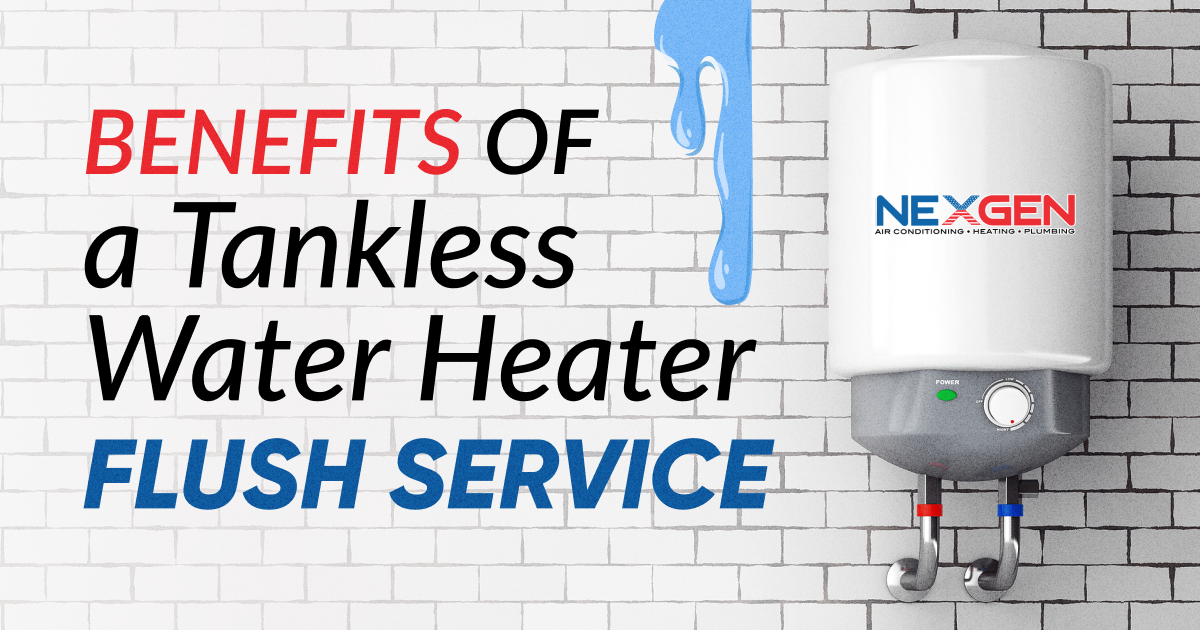
Flushing any water heater can improve its performance and reduce wear and tear. Tankless models are more efficient than traditional tank units; plus, their compact size allows you to fit them practically anywhere. But they still need a fair amount of upkeep. A tankless water heater flush service is a form of maintenance that’ll help get more from your system. The benefits of it include:
Remove Mineral Scale
Mineral deposits, along with sediment, are among the most detrimental issues for a water heater. Buildup reduces the unit’s operating capacity and can clog up water lines. It can lead to issues with water flow and water pressure. Flushing the tankless water heater of scale prevents these issues and enables the unit to work at full capacity.
Faster Heating
If a tankless water heater isn’t flushed regularly, it may take longer to provide hot water. Therefore, schedule maintenance if heating times are increasing. Mineral scale or obstructions may be impeding heat transfer and, in the process, you’ll use more water while waiting for it to reach the right temperature.
Reduced Noise
Noise from a tankless water heater often comes from sediment and mineral buildup inside it. The water flow must move past obstructions to reach its destination. Don’t wait for the noise to go away on its own. Once it does, this means the buildup has solidified and water cannot pass through.
Lower Utility Bills
Investing in a tankless water heater flush service can lower your utility bills. Since the unit can work more efficiently, it won’t require as much power to run. You’ll also use less water while waiting for the temperature to increase. Water and gas or electric bills (depending on the type of unit) should be noticeably lower after the unit is flushed.
Increased Longevity
Flushing a tankless water heater reduces wear and tear and can prevent system failure. The cost of a system flush is much less than premature replacement. You can extend the life of your water heater by as much as several years by scheduling regular flushes.
Improved Water Quality
Buildup in your water heater can lead to sediment, discoloration, odors, and other water quality issues. By flushing residue that builds up inside, you can avoid or resolve these. It can improve the overall quality of your home water supply.
Continued Warranty Protection
Depending on your tankless water heater’s warranty, it may require routine maintenance to stay valid. Also, it may not cover failure that occurs due to sediment or mineral scale buildup. You can maintain warranty protection by having a plumber flush your water heater professionally and provide the documentation proving they did so.
How Often to Flush a Tankless Water Heater
Most professionals suggest flushing a tankless water heater every year. Others suggest doing so once every two years or, in areas with hard water, every six to nine months. You can also flush an older unit that hasn’t been fully maintained. It can restore efficiency and protect the unit from damage.
However, we recommend not waiting too long between each tankless water heater flush service. Over time, scale buildup can weaken and eat through pipes. Holes can form and cause leaks in pipes within and attached to the water heater. The best option is to have a qualified plumber inspect the unit, determine if it can be flushed, and perform the necessary services.
Schedule a Tankless Water Heater Flush Service with NexGen
At NexGen, we are experienced with installing, repairing, and maintaining tankless water heaters. Our technicians are fully licensed and insured. By joining our X Protection Plan, you’ll receive priority service and perks such as an annual tankless water heater flush and inspection. To learn more or request maintenance, book online or call (833) 729-9735 today.
What Should I Pay for Hydro Jetting Services Near Me?
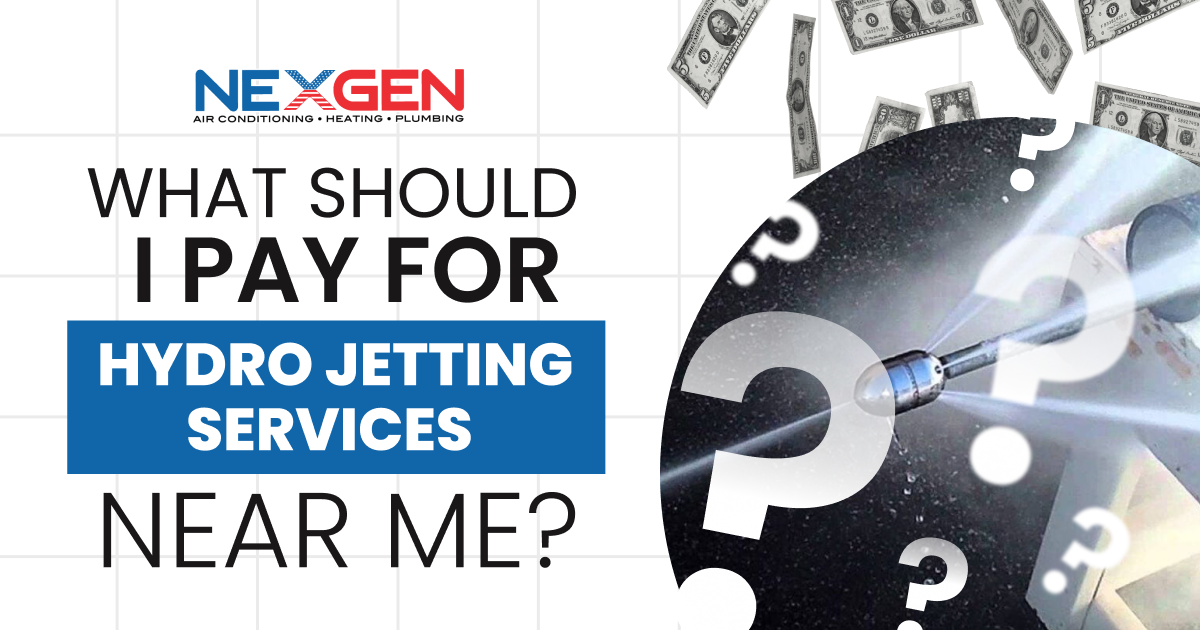
To understand the value of hydro jetting, let’s look at the benefit of no digging. It’s a trenchless method. Therefore, the time and expense of excavating sewer pipes, along with the labor involved, are avoided. But nationally, the average cost of hydro jetting is $700 (as of 2023). The estimate for a simple job may be lower, but on the high end, the service can cost as much as $1,100 for a residential customer.¹
However, commercial hydro jetting can cost as much as $3,300.¹
How Does Hydro Jetting Compare to Sewer Line Snaking?
Hydro jetting has similarities to snaking a sewer line, which averages $200 to $600.¹ A sewer snake is a long flexible metal rod. It’s inserted into the cleanout and, once in the pipe, a machine is activated to rotate the rod and sharp blades that cut through debris, tree roots, or whatever else is causing the clog. A hydro jetting hose is connected to a machine on one end, while the other end is inserted into the pipe. Long and flexible, it pumps a powerful jet of clean water into the sewer line to clear a blockage.
How Is the Cost Determined?
Hydro jetting isn’t typically priced at a flat rate. The factors that influence how much you pay for it include
- The Extent of the Clog: Generally, the more severe the clog, the longer it takes to clean the sewer line. Therefore, the higher the cost. The process usually takes under two hours, but treating an entire line can take longer. If you have a severe clog, your plumber may suggest scheduling hydro jetting as preventative maintenance. It can avoid more costly repairs.
- Access to the Pipe/Clog: The plumber will usually access the sewer line via the cleanout, which has a removable cap. If the cleanout is easy to get to, hydro jetting may cost less. But if the cleanout is in a basement, crawlspace, or another hard-to-reach area (or your property has no cleanout), you’ll pay more for the service. Fortunately, most cleanouts are located outside the home near landscaping or the foundation, driveway, or curb.
- Sewer Line Video Inspection: A video inspection allows a plumber to view the pipe from the inside and see signs of damage or leakage. Pipe sections that need repair are mapped, so a crew knows where to work. The video feed also helps determine if the pipe is strong enough for hydro jetting. Depending on a few factors, a sewer line video inspection can cost $300 to $1,200 (in addition to the cost of hydro jetting).¹
- Repairs: If your sewer line needs to be repaired or replaced, you may pay an additional $2,000 to $15,000.¹ The cost depends on how much pipe must be replaced, the depth of the sewer line, and other factors. Preventative maintenance can protect your sewer line and avoid these costs, potentially saving you tens of thousands of dollars and the aggravation of persistent sewer clogs.
Why Hire a Hydro Jetting Professional
A professional plumber can safely hydro jet a sewer line or determine if the pipe is too old, damaged, or weakened to hold up. It’s a fast way to clear minor clogs and residual debris consisting of a wide range of materials. Wastewater is dirty and contains harmful bacteria; a hydro jetting professional helps eliminate these organisms, the odors they produce, and the risk of infection.
Call NexGen for Hydro Jetting Services Near You
Hydro jetting can remove stubborn clogs and keep your sewer line in top condition. NexGen uses industrial-grade machines that generate pressures of up to 4,000 psi to break up virtually any clog. To schedule hydro jetting services in Southern California to clear a blockage, fix a backed-up sewer, or maintain the line, call (805) 301-6788.
Source:
Do I Need a Water Filtration System Repair?
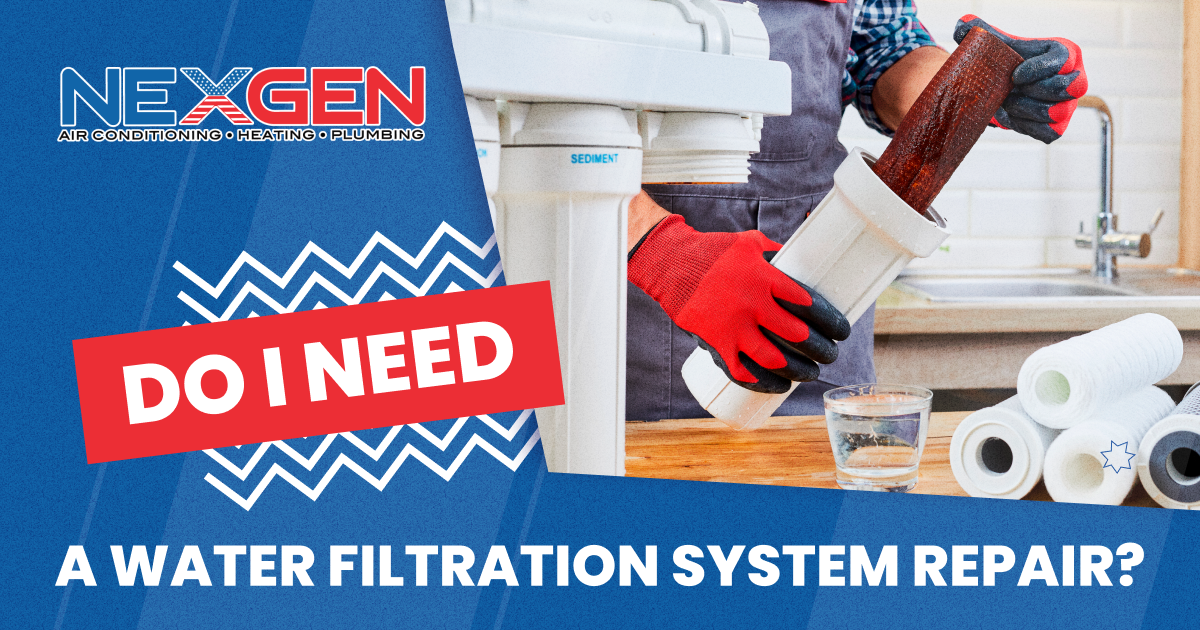
Homeowners in Southern California rely on NexGen for water filtration installation and repair. Just like any other part of your plumbing system, water filtration components need occasional service. Below, we’ll look at the signs you need water filtration system repair and when to schedule service for water treatment equipment.
The most common signs your water filtration system isn’t working properly include:
- Changes In Water Pressure: Low water pressure can signal an issue, such as a clog, in your filtration system. Submerge a shower head in a bucket of water and look for air bubbles. If you see any, the system should be cleaned or replaced. High or inconsistent water pressure warrants calling a plumber, as it can mean your water filtration system is malfunctioning.
- Changes In Water Quality: A bad taste or foul odor can mean the filter needs to be cleaned or replaced. An odor is usually harmless unless it smells like sulfur or hydrogen sulfide. Call a plumber to address potential issues with filtering components or mineral deposits. Cloudy water can mean there’s debris in the system. If the water turns yellow or brown, pipes may be clogged by mineral deposits or the water filtration system may have failed.
- Higher Water Bill: If your water bill has increased and your water usage habits haven’t changed, there could be a leak or other problem with your water filtration system. Call a plumber to check for any issues. Once they fix the problem, your water bill should go back to normal.
- White Residue on Fixtures: If your filtration system softens hard water, and you see white streaks on faucets, shower heads, and other surfaces, it may not be working properly. Other issues with your water supply can cause powdery residue to form. Always assume it’s a plumbing issue and call a professional to address it.
- Parts of Your Home Have No Hot Water: Call for help if hot water is lacking in certain rooms or areas of your home. It can indicate a filtration problem or a clog in your water heater. A plumber can determine where the problem is originating from, fix it, and replace faulty parts.
- Strange Noises: Some water filtration systems will make odd noises if they are malfunctioning. Gurgling, rumbling, or moaning sounds from pipes can occur due to a filtration problem, so contact a professional to assess the situation.
When to Get Your Water Filtration System Serviced
Keeping your water supply clean and clear requires mechanical processes. How frequently filtration equipment is serviced depends on the quality of your municipal water supply, how much water your family uses, and other factors, The type of equipment matters too:
- Reverse Osmosis Filtration Systems: The equipment can contain three or more filters and a reverse osmosis membrane, which should be replaced every three to five years. General filters should be replaced every 12 months.
- Ultraviolet (UV) Systems: Sediment and tannin contamination is common with UV systems. To maintain your filtration system, replace the bulb every 12 months and the sleeve every two years (it should also be cleaned during annual maintenance by a professional).
- Water Softeners: Minerals trapped by ion-charged media build up over time. Saltwater in the brine tank regenerates the media, which can last up to 15 years. If the tank is well-maintained, re-bedding it with new media can restore the system. Otherwise, it may require early replacement.
- Sediment Filters: Sand, sediment, and other debris the filter collects can wear out other parts of the system. The filters should be replaced every six to 12 months. The poorer the water quality, the more frequently the filter will need replacement.
- Iron Filters: Rust stains, odors, cloudiness, and a bad taste can mean there’s a high amount of iron in your water supply or the media in an iron filter is full. Replacing the media can avoid water filtration system repair. Have a professional service the filter every 12 months and ensures the media tank is in good shape.
- Tannin Filters: These remove decomposed organic materials that can stain water. To maintain a tannin filtration system, the media must be cleaned and recharged and the brine tank must be kept half full. Service is required every 12 months. But call for repairs if the water looks tea-colored.
Call NexGen for Water Filtration System Repair
We repair inline and whole-house water filtration systems so they continue to remove heavy metals, chlorine, disinfectants, pesticides, hard water minerals, and other impurities. Our technicians are fully licensed and insured and can address any problem. As a member of our X Protection Plan, you’ll receive priority service, expedited repairs, and an extended parts and labor warranty. Check back often for our latest offers. To request 24/7 service, call (833) 729-9735 today.


















